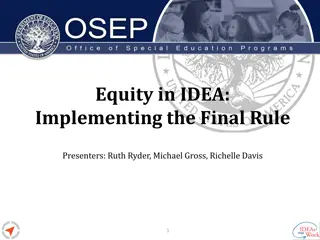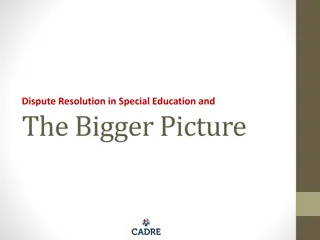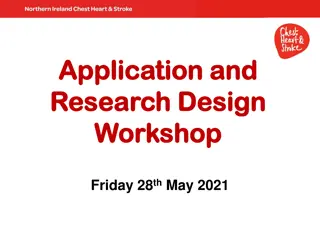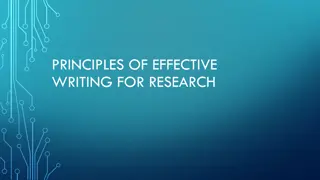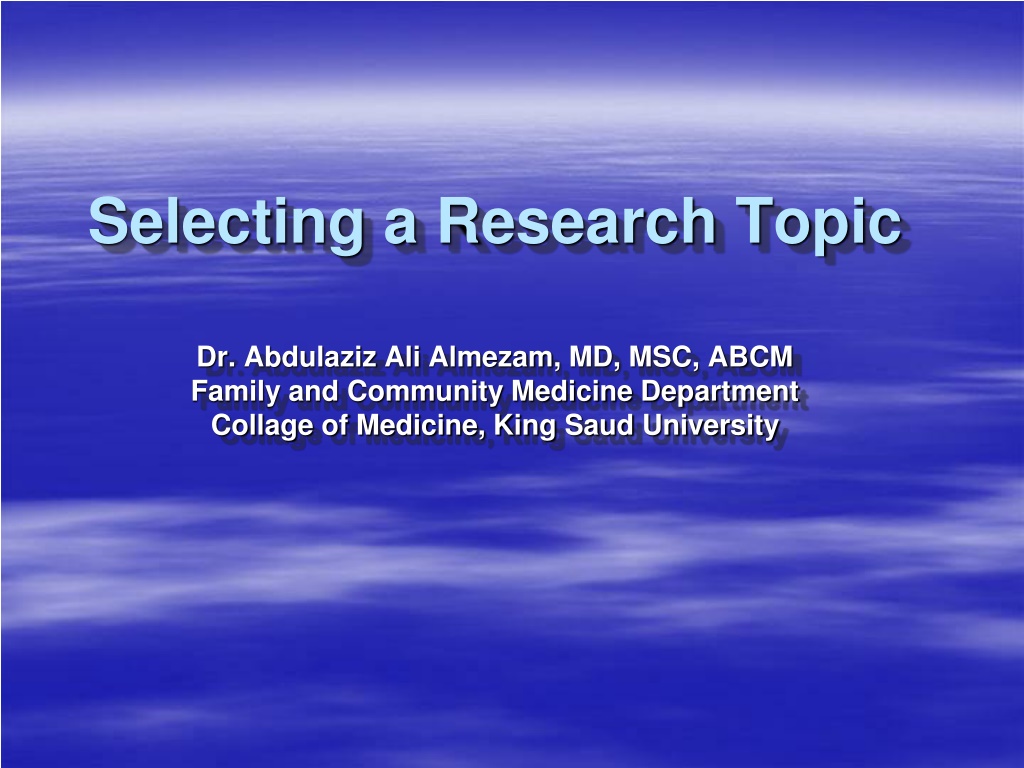
Types and Importance of Research in the Medical Field
Discover the significance of research in medicine through an exploration of basic research, applied research, and experimental development. Learn how research contributes to advancements in understanding fundamental principles and solving practical problems to enhance healthcare outcomes.
Download Presentation

Please find below an Image/Link to download the presentation.
The content on the website is provided AS IS for your information and personal use only. It may not be sold, licensed, or shared on other websites without obtaining consent from the author. If you encounter any issues during the download, it is possible that the publisher has removed the file from their server.
You are allowed to download the files provided on this website for personal or commercial use, subject to the condition that they are used lawfully. All files are the property of their respective owners.
The content on the website is provided AS IS for your information and personal use only. It may not be sold, licensed, or shared on other websites without obtaining consent from the author.
E N D
Presentation Transcript
Selecting a Research Topic Dr. Abdulaziz Ali Almezam, MD, MSC, ABCM Family and Community Medicine Department Collage of Medicine, King Saud University
Definition of Research - The systematic investigation into and study of materials and sources in order to establish facts and reach new conclusions. -The strict definition of scientific research is performing a methodical study in order to prove a hypothesis or answer a specific question. Finding a definitive answer is the central goal of any experimental process.
Word (Research) Origin& History 1577, "act of searching closely," from M.Fr. recerche (1539), from O.Fr. recercher "seek out, search closely," from re-, intensive prefix, + cercher "to seek for" (see search). Meaning "scientific inquiry" is first attested 1639. Phrase research and development is recorded from 1923.
Type of Research 1.Pure research, basic research, or fundamental research. 2.Applied research. 3.Experimental Development. Other classification: Primary Research Vs Secondary Research Population Based Vs Hospital Based
Basic research -Basic research is a research carried out to increase understanding of fundamental principles. Pure research generates new ideas, principles and theories, which may not be immediately utilized; though are the foundations of modern progress and development in different fields -For example, basic science investigations probe for answers to questions such as: What are Chromosome composed of? What is the specific genetic code of Albinism cases? .
Applied research -Applied research is a form of systematic inquiry involving the practical application of science. It is designed to solve practical problems of the modern world, rather than to acquire knowledge for knowledge's sake. One might say that the goal of the applied scientist is to improve the human condition. -For example, applied researchers may investigate ways to: treat or cure a specific disease improve the vaccine or drug efficiency.
Experimental Development -The term R&D or research and development refers to a specific group of activities within a business. -The activities that are classified as R&D differ from company to company, but there are two primary models. In one model, the primary function of an R&D group is to develop new products; in the other model, the primary function of an R&D group is to discover and create new knowledge about scientific and technological topics for the purpose of uncovering and enabling development of valuable new products, processes, and services.
Research Process 1. Define the research question or hypothesis. 2. Develop research teams with a principal investigator for each area. 3. Work on the research protocol and have a general presentation and discussion of proposed projects. 4. For each of the projects define the proposed papers to be published and responsible authors. 5. Start writing the first draft of the paper from day one of the project and have it peer reviewed very early.
Research Process 6. Have a close supervision and engagement in the data collection, processing and analysis phases. 7. Final write-up of the papers followed by an internal discussion-presentation. 8. Peer review of papers by members of the department and external reviewers. 9. Timely submission of papers for publication. 10. Timely follow-up on revisions and resubmission. 11. Public media press release close to the date of publication.
Importance of Choosing an Idea - Deciding on an Idea or answerable and relevant research question lies at the heart of all good research projects. - The right way toward a publishable article. - Appreciated by decision makers.
Factors to consider in Selecting A Research Problem 1 The topic should be important significant. Writing a thesis or dissertation is an exercise to learn how to conduct research. However, graduate students can learn the research process on an important topic just as easy as learning the research process on a piddle topic!
Factors to consider in Selecting A Research Problem 2 Consider the feasibility of the project. How much time do you have available? Do you really want to do a longitudinal study that will take 3 years to complete for a MS thesis? How difficult is it. Are data available? How much will it cost ?
Factors to consider in Selecting A Research Problem 3 Make sure the topic is ethical to study.
Factors to consider in Selecting A Research Problem 4 You should have a personal interest in the topic. It is the fuel of your work. By the time you are done, you may really be tired of the topic.
Factors to consider in Selecting A Research Problem 5 The newness of the topic may hold you interest longer, however there is some value in repeating previous research.
Factors to consider in Selecting A Research Problem 6 Make sure the research question is clear.
Factors to consider in Selecting A Research Problem 7 Make sure the research question is clear.
Factors to consider in Selecting A Research Problem 8 The research topic should be broad enough to allow the student access to enough information, yet specific enough to make the research scope reasonable.
Factors to consider in Selecting A Research Problem 9 For example, a student choosing the topic First Aid would find it impossible to include everything about first aid: home remedies, history of emergency services, evolution of first-aid courses. On the other hand, a student choosing to research The Application of Band- Aids to Skin Abrasions probably will not
Factors to consider in Selecting A Research Problem 10 The research topic should be one that is academically and creatively challenging to the student. The topic requires an academic and creative stretch for the student. Be careful not to choose a topic that is limited to simple ideas or has little application or extension possibilities. Such a choice would make the paper
Factors to consider in Selecting A Research Problem 11 Mentorship with an expert on your topic are required for the project, therefore, consideration of availability of such individuals should be considered during topic selection.
Health-Care Service Priorities Priority is given to health-care services that: -Impose high costs on MOH. -May be over utilized or underutilized. -May significantly improve the prevention, treatment, or cure of diseases and conditions that impose high direct or indirect costs on patients or society. -Places a great burden on people, especially those who are priority populations .
Patient Population Priorities Priority is also given to suggestions that focus on certain patient populations, including: Low-income groups, Minority groups, Women Children, The Elderly, Individuals with special health-care needs, such as those with disabilities, those who need chronic care or end-of-life care, or those who live in inner-city and rural areas.
Priority Conditions -Arthritis and nontraumatic joint disorders (Muscle, bone, and joint conditions) -Cancer (Cancer). -Cardiovascular disease, including stroke and hypertension (Heart and blood vessel conditions). -Diabetes mellitus (Diabetes). -Functional limitations and disability (Functional limitations and physical disabilities). -Infectious diseases, including HIV/AIDS (Infectious diseases and HIV/AIDS). -Peptic ulcer disease and dyspepsia (Digestive system conditions). -Pregnancy, including preterm birth (Pregnancy and childbirth), -Pulmonary disease/asthma (Breathing conditions). -Substance abuse (Alcohol and drug abuse).
Selecting a Research Topic The ability to develop a good research topic is an important skill. Sometimes instructors will assign a specific topic, usually they will ask you to select a topic that interests you.
Generation of Creative Ideas: 1.Divergent Thinking: Techniques Used: Brainstorm for ideas, Idea Exchange & Idea Links). Controlling Rules: a. Avoid judging or evaluating idea. b. Record a high volume of idea. c. Build on other ideas. d. Seek new and interesting combination of ideas.
Generation of Creative Ideas: 2.Convergent Thinking Techniques Used: (Matrix Converger, Stoplight Voting, thought Organizers & Idea Generator Software). Controlling Rules: a. Identify positive aspect of ideas. b. Follow a deliberate system or plan for evaluation. c. Consider unique and Interesting idea. d. Keep on track.
Skills Needed For Selection of A Research Topic -Read general background information -Focus in on a manageable topic -Make a list of useful keywords -Be flexible -Define your topic as a focused research question -Research and read more about your topic -Formulate a thesis statement
Refining the research question 1 First: the essential literature review will provide information about the extent to which the topic has been previously researched and may confirm or refute the novelty of your own question. The question itself may need to be re-phrased to fit more clearly with the required next steps in researching your topic of interest.
Refining the research question 2 Second: asking questions from colleagues and checking on current research using methods such as national research registers may provide further information about current research in your area of interest, and possibly avoid duplication of research effort.
Refining the research question 3 Third: writing the protocol is certain to sharpen up your ideas about your research there is nothing like the challenge of a blank sheet of paper and the need to write a one-sentence hypothesis to focus the mind.
Refining the research question 4 Finally, most research requires a supervisor and it is likely that during the early stages of setting up a research project your supervisor will have something to say about your research question.
Testing the question This is critical, not least because many researchers are simply too close to their research to see it, objectively, for what it is. Edward Huth, a distinguished editor of the Annals of Internal Medicine, recommended two crucial tests of any research question: -The who cares? test - The so what? test.
Criteria to help assess your research Assessment criteria that you and your supervisor might apply to your research include: -Novelty -Relevance -Impact -Feasibility -Fundability -Publishability -Ethical issues
Hypothesis Development 1 1. Public Health Problem and issues of prevention and control. 2. Clinical Observations case and clinical series. 3. Observations from experimental studies 4. Previous studies and literature. 5. Formal and informal scientific interface. 6. Synthesis of evidence.
Hypothesis Development 2 It is most important to formulate the question that specifies: Outcome of interest clearly Determinant(s) of the outcome Direction of effect of determinant to outcome
Conclusions Getting the research question right is an essential, although not always straightforward, step in any research project. Settling on a research question is often difficult to do in isolation, so that obtaining advice from experts and colleagues, collecting information from the literature and developing an awareness of the context in which your research is likely to be undertaken will all contribute to a successful outcome.
REFERENCES 1.Huth E. How to write and publish papers in the medical sciences. London: Williams & Wilkins, 1990. 2.Rietzschel, E. F., Nijstad, B. A., & Stroebe, W. (2006). Productivity is not enough: A comparison of interactive and nominal brainstorming groups on idea generation and selection. Journal of Experimental Social Psychology, 42, 244 251. 3.Runco, M. A., & Charles, R. E. (1993). Judgments of originality and appropriateness as predictors of creativity. Personality and Individual Differences, 15, 537 546. 4.Shafir, E. (1993). Choosing versus rejecting: Why some options are both better and worse than others. Memory and Cognition, 21, 546 556.







